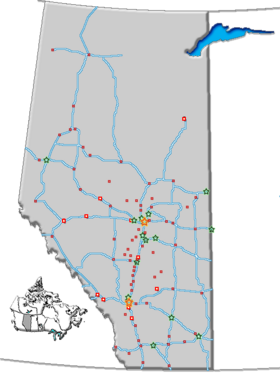Leduc, Alberta
| City of Leduc | |||
|
|||
 |
|||
| Coordinates: | |||
| Country | |||
|---|---|---|---|
| Province | |||
| Region | Edmonton Capital Region | ||
| Census division | 11 | ||
| Established | Village: 15 Dec 1899 | ||
| Incorporated | Town: 15 Dec 1906 | ||
| City: 01 Sep 1983 | |||
| Government [1] | |||
| - Mayor | Greg Krishke | ||
| - Governing body | Leduc City Council | ||
| - MP | James Rajotte | ||
| - MLA | George Rogers | ||
| Area | |||
| - Total | 36.97 km² (14.3 sq mi) | ||
| Elevation | 735 m (2,411 ft) | ||
| Population (2006)[2] | |||
| - Total | 16,967 | ||
| - Density | 458.9/km² (1,188.5/sq mi) | ||
| Time zone | MST (UTC-7) | ||
| Postal code span | T9E | ||
| Area code(s) | +1-780 | ||
| Highways | Queen Elizabeth II Highway | ||
| Website: City of Leduc | |||
Leduc (pronounced /ləˈduːk/) is a city in the province of Alberta, Canada. It is located 33 kilometers (21 mi) south of the provincial capital of Edmonton and is part of the Edmonton Capital Region metropolitan area.
Contents |
History
Leduc was first established in 1899, when Robert Telford, a settler, bought land near a lake which would later bear his name. It was on that piece of land where the new settlement would take root. Telford previously served as an officer for the Royal North West Mounted Police, and later became Leduc's first postmaster, first general merchantman and first justice of the peace.
According to popular local legend, the city's name was decided in 1890 when a settler setting up a telegraph office needed a name for the new settlement and decided that it would be named after the first person who came through the door of the telegraph office. That person was Father Hippolyte Leduc, a priest who had served the area since 1867.
The town continued to grow quietly over the decades and Alberta's historical oil strike on February 13, 1947, was made near the town at the Leduc No. 1 oil well.[3]
Leduc was first incorporated as a village in 1899, and went on to become officially a town in 1906. It became a city in 1983. By that time its population had reached 12,000.
Demographics
In 2006, Leduc had a population of 16,967 living in 6,718 dwellings, a 12.9% increase from 2001. The city has a land area of 36.97 km² (14.3 sq mi) and a population density of 458.9/km² (1,188.5/sq mi).[2]
Economy
The city's economy is dominated by the oil and gas industry. Nisku, a major industrial park, has grown massively because of it. Edmonton International Airport is also a major employment source, as it lies adjacent to the city.
Although it lies within the Edmonton Capital Region, it has not grown as rapidly as other communities near Edmonton have. However, it has grown steadily over the past decades.
Emergency Services
The City of Leduc has its own fire and emergency medical services department. The Fire Services is made up of one full-time chief, three deputy chiefs, full-time administrative support, 17 full-time members (13 firefighters, 4 dispatchers), 40 volunteer firefighters and four casual dispatchers. The members that staff the ambulances are cross-trained in firefighting and EMT. The Fire Services respond to all calls in the City of Leduc and cover the southern area of Leduc County.
Policing for Leduc is provided by the Royal Canadian Mounted Police (RCMP).
Additional law enforcement is provided by the City of Leduc Enforcement Services, who are comprised of three members, appointed as Peace Officers by the Alberta Solicitor General.
Enforcement Services is part of an amalgamated service with the RCMP. Our objective is to support and enhance crime prevention and municipal law enforcement in our community.
The primary role of the Enforcement Services Unit is to enforce the Traffic Safety Act and all of its regulations within the City of Leduc. They are also responsible for enforcement of Provincial Statutes and Municipal bylaws of the City of Leduc.
Other duties that these officers perform include the enforcement of the Gaming & Liquor Act, the Environmental Protection Act, park patrols and assisting RCMP officers with Check Stops. Peace Officers are able to issue 24 hour suspensions and arrest persons found with outstanding warrants.
Traffic Safety in Leduc is accomplished through a policing partnership with the RCMP and Enforcement Services. Both of these agencies work together in a strategic approach with the intent of reducing collisions in the City.
Selective Traffic Enforcement Program (STEP)
Each month, the City of Leduc Enforcement Services and RCMP members select an area of Traffic Enforcement which has been identified as a high risk factor within the city, and place a greater emphasis on enforcement operations in this area for the duration of that month. Most often, this is statistically linked to areas of risk associated with causing or contributing to injury and fatality motor vehicle collisions. Issues of community concern may also be identified as an selected area for the STEP initiative.
It is expected that by having these month-long, high-profile objectives, we will help to raise awareness of the most serious and dangerous infractions by drivers in Leduc & Area. By highlighting a new target each month, City of Leduc drivers are reminded of the numerous things they can be doing to ensure that they are driving safely.
Some of projects and activities include:
Anti-impaired driving programs, speed reduction programs, targeted enforcement of high volume traffic/high collision intersections, investigation of serious motor vehicle accidents, education and awareness programs, and assistance to special events (parades and other large public gatherings)
The City of Leduc Protective Services building houses Police (R.C.M.P.), Fire, Ambulance, Enforcement Services and Disaster Services.
The Protective Services Building is located at:
4119-50 Street, Leduc, AB General Phone (including Fire Administration, Enforcement Services and Animal Control): 980-7275 Emergency Only 911
References
- ↑ City of Leduc. "City Council". Retrieved on 2007-06-23.
- ↑ 2.0 2.1 Statistics Canada (Census 2006). "Leduc—Community Profile". Retrieved on 2007-06-14.
- ↑ CBC Digital Archives. Striking Oil in Alberta
External links
- Official City of Leduc—Municipal Page
- City of Leduc Fire Services
 |
Devon | Edmonton Nisku |
Beaumont |
|
|||
| Calmar Drayton Valley |
New Sarepta | ||||||
| Pigeon Lake | Millet Lacombe |
Camrose |
|
|||||||||||

